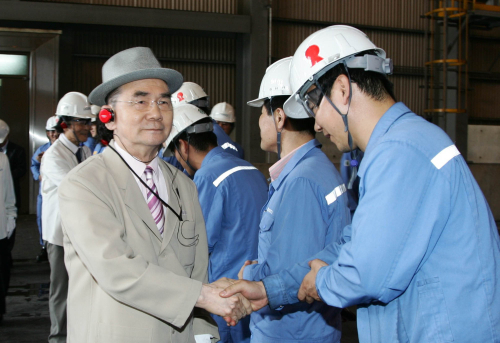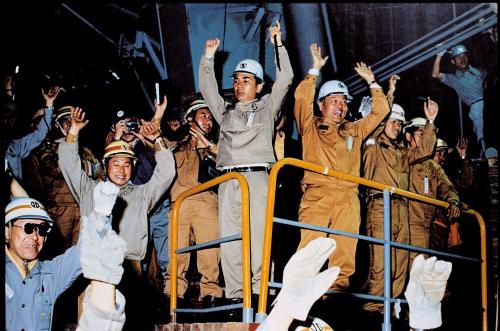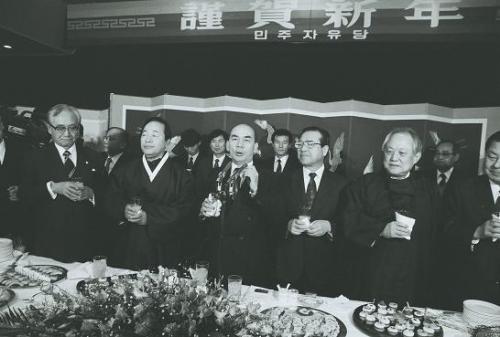POSCO founder who also served as prime minister leaves trailblazing legacyPOSCO’s honorary chairman Park Tae-joon, who died on Tuesday at age 84, was a trailblazer who paved the way for the nation to become one of the world’s top steel-making countries.
Park, one of the icons of Korea’s economic success, left a legacy in two sectors, business and politics, but earlier said he would be remembered as a businessman. Throughout his life, he led a remarkable career as the country’s top businessman who helped build POSCO into a world-class steelmaker.
Although Park worked under the initial guidance of his former Army superior and President Park Chung-hee, who was keen to nurture a steel industry as part of efforts to industrialize Korea as quickly as possible, the former chief of POSCO cut out a path unique among business leaders in Korea.
Park Tae-joon was born in a rural town in South Gyeongsang Province in 1927. At age 6, he crossed the East Sea to live in Japan with his parents. He attended Waseda University, majoring in mechanical engineering, but before finishing he returned to Korea as the nation gained independence from colonial Japanese rule in 1945.
Park’s life began to change drastically as he entered military academy, where he famously encountered Park Chung-hee, then a captain, a meeting that later led to a historic undertaking in the steel business.

POSCO honorary chairman Park Tae-joon shakes hands with an employee at one of the firm’s factories in Pohang, North Gyeongsang Province, in August 2007. (Yonhap News)
Park Tae-joon survived the bloody Korean War from 1950-53 and maintained his relations with Park Chung-hee, who seized power in a military coup in 1961. Even though the future steel magnate was not officially involved in the military coup, he emerged as a powerful and key member of the new military regime.
He tried to stay away from politics, though, and started preparing to study in the United States shortly after the 1963 presidential election. Although Park eventually gave up this plan on the special order of then-President Park, and instead set off to Japan as a special envoy, it is widely known that he wanted to keep a certain distance from politics.
Park’s primary concern in the following years was to kick-start POSCO, a project that President Park thought would contribute greatly to the nation’s drive for economic development.
Park Tae-joon founded POSCO in 1968 and spearheaded the first phase of the construction, which began in 1970. The project, which elicited only skeptical responses from many experts at home and abroad, was completed ahead of schedule in 1973, with Park working tirelessly and encouraging employees to advance the deadlines.

POSCO founder Park Tae-joon (center) joins in an event celebrating the production of molten metal from the steelmaker’s first blast furnace in 1973. (Yonhap News)
The first-phase facilities began to turn a profit over a six-month period of full operations, which convinced Park to work on the second and third phases of construction, laying a solid foundation for POSCO’s take-off on the global stage. His tenure, which lasted for 25 years until 1992, is largely regarded as pioneering, with his trademark focus and tirelessness helping catapult the latecomer in the steel industry into the global top tier.
But his dabbling in politics was not-so-glamorous. He entered the political world from the early 1980s, serving as a member of the National Assembly and climbing the ladder relatively quickly.
During his political career, he was elected to the National Assembly four times while serving as key post-holder of political parties.
In 1990, he came to center stage when he was named head of the then-ruling Democratic Justice Party. Days after the inauguration, his ruling party merged with two opposition parties to create a giant ruling Democratic Liberal Party.
But under the ruling party, Park maintained sour relations with opposition leader-turned ruling party leader Kim Young-sam. Kim later became president after winning the party’s presidential nomination.
Park had been odds with Kim over the introduction of a cabinet system in which the prime minister manages national affairs. Park had called for Kim to promise to adopt the system, but Kim rejected it.

Park Tae-joon (center), then chairman of the ruling Democratic Liberal Party, attends a New Year’s Day celebration organized by the party in 1992. (Yonhap News)
Park left the DLP ahead of the 1992 presidential election in which Kim was elected. After the Kim government was inaugurated in 1993, Park was deprived of his honorary chairmanship of POSCO and indicted for bribe-taking.
He would fly to Japan on a self-impose “hibernation” for four years. He returned home in 1997 and made a political comeback by winning a parliamentary seat in Pohang. He assumed the presidency of the minor opposition United Liberal Democrats after opposition leaders Kim Dae-jung and Kim Jong-pil joined hands in 1997.
Park served as the prime minister under the Kim Dae-jung government that was inaugurated in 1998. He resigned, however, after becoming entangled in a real-estate scandal after only four months in office.
Park returned to POSCO as honorary chairman in 2002. He is surveyed by his wife Chang Ok-ja, four daughters and one son.
By Yang Sung-jin (
insight@heraldcorp.com)
Profile of Park Tae-joon
1927 ― Born in a small town in Dongrae County, South Gyeongsang Province
1945 ― Enrolls at Waseda University in Japan
1946 ― Leaves school and returns to Korea
1948 ― Applies to join a military guard in Busan, meets then-Army Captain Park Chung-hee
1954 ― Graduates from the Korea Army College at top of the class
1957 ― Meets Army General Park Chung-hee for the second time
1961 ― Becomes chief of staff for Park Chung-hee following May 16 military coup
1963 ― Prepares to study in the U.S., retires as major general
1964 ― Drops plans to go abroad, picked to head Korea Tungsten Co.
1967 ― Picked to head steel industry project by Park Chung-hee
1968 ― Becomes first president of POSCO
1981 ― Becomes first chairman of POSCO, elected to the National Assembly
1985 ― Starts building Pohang University of Science and Technology
1990 ― Named chief of the ruling Democratic Justice Party
1992 ― Construction of four factories at Gwangyang completed
1993 ― Leaves country after probe over slush fund charges
1997 ― Returns to Korea, wins by-election in Pohang, assumes presidency of the opposition United Liberal Democrats
2000 ― Resigns ULD presidency, named prime minister, privatization of POSCO completed
2001 ― Undergoes first operation for lung problems, renamed honorary chairman of POSCO
2008 ― Served as chairman of POSCO Cheongam foundation
2011 ― Passes away on Dec. 13








![[Graphic News] More Koreans say they plan long-distance trips this year](http://res.heraldm.com/phpwas/restmb_idxmake.php?idx=645&simg=/content/image/2024/04/17/20240417050828_0.gif&u=)